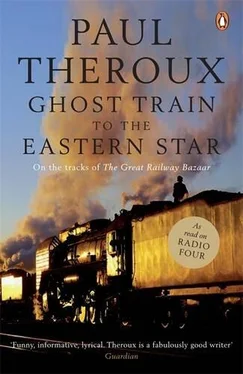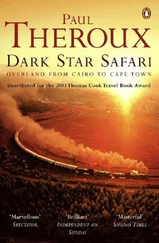Only one other passenger so far, an elderly woman. I sat down and drowsed until I was woken by a few toots on the train whistle, and off we went, this other Orient Express, pulling out of the Gare de l'Est without ceremony. After a mile or so of the glorious city, we were rushing through a suburb and then along the banks of the River Marne, heading into the hinterland of eastern France in the lowering dusk.
Traveling into the darkness of a late-winter evening, knowing that I would be waking up in Vienna only to change trains, I felt that my trip had actually begun, that everything that had happened until now was merely a prelude. What intensified this feeling was the sight of the sodden, deep green meadows, the shadowy river, the bare trees, a chilly feeling of foreignness, and the sense that I had no clear idea where I was but only the knowledge that late tonight we would be passing through Strasbourg on the German border and tomorrow morning we'd be in Austria, and around noon in Budapest, where I'd catch another train. The rhythm of these clanging rails and the routine of changing trains would lead me into central Asia, since it was just a sequence of railway journeys from here to Tashkent in Uzbekistan.
A lovely feeling warmed me, the true laziness of the long-distance traveler. There was no other place I wished to be than right here in the corner seat, slightly tipsy from the wine and full of bouillabaisse, the rain lashing the window.
I did not know it then, of course, but I would be traveling through rain and wind all the way through Turkey, on the Black Sea coast, through Georgia, and as far as Azerbaijan on the Caspian Sea, and would not be warm — would be wearing a woolly sweater and a thick jacket — until I was in the middle of Turkmenistan, among praying Turkmen, mortifying themselves and performing the dusty ritual of waterless ablutions, called tayammum, also on a train, but a dirty and loudly clattering one, in the Karakum Desert, where it never rained.
The little old lady caught my eye, and perhaps noticing that the book I had in my lap was in English, said, "It's snowing in Vienna."
With the pleasant thought that I would be in Istanbul in a few days, I said, "That's all right with me. Where are we now?"
"Château-Thierry. Épernay."
French place names always seemed to call up names of battlefields or names on wine labels. The next station was Châlons en Champagne, a bright platform in the drizzle, and the tidy houses in the town looking like a suburb in Connecticut seen through the prism of the driving rain. Then, in the darkness, Nancy, the rain glittering as it spattered from the eaves of the platform, and a few miles farther down the line, clusters of houses so low and mute they were like the grave markers of people buried here.
Somewhere a woman and two men had joined the old woman and me in the compartment. These three people talked continuously and incomprehensibly, one man doing most of the yakking and the others chipping in.
"What language are they speaking?" the old woman asked me.
"Hungarian, I think."
She said she had no idea, and asked why I was so sure.
I said, "When you don't understand a single word, it's usually Hungarian."
"It could be Bulgarian. Or Czech."
"Where do you live?" I asked.
"Linz," she said.
"Isn't that where—?"
Before I finished the sentence she laughed very hard, cutting me off, her eyes twinkling, smiling at what we both knew, and said, "It's a charming little city. About a quarter of a million people. Very clean, very comfortable. Not what you might think. We want to forget all that business."
"All that business" meant that Adolf Hitler, the Jackdaw of Linz, had been born there, and his house still stood, some deluded people making pilgrimages, though all the symbolism and language of Nazism was illegal in Austria. Just about this time, the writer David Irving was given a jail sentence and punished for making the irrational claim in print that the Holocaust had not happened. It was as loony as saying the earth was flat, but in Austria it was unlawful.
"They're coming back in France," the old woman said.
"Nazis, you mean?"
"My daughter says so. She lives in Paris. I go to visit her." She looked out the window — nothing to see but her own reflection.
"I take this train all the time."
"You could fly, maybe?" I asked, only to hear what she would say.
"Flying is horrible. Always delays in this weather. This is much better. We will be in Linz early tomorrow morning, and I will be home for breakfast." She leaned over again and whispered, "Who are they?"
She was perhaps seventy-five or so, and had lived (so she said) her whole life in Austria. Next door to Hungary all that time and she didn't have a clue about this just-over-the-border language, could not even identify Magyar-speakers, which they were — I asked them on the platform at Strasbourg, where we waited for the sleeping car.
Ten o'clock on a cold night in March, the rain smacking the rails; some carriages slid along the platform on creaking wheels, with the welcome word Schlafwagen on the side, lettered in gilt. Why was it I felt no excitement entering a great hotel on a rainy night like this but was thrilled to climb up the stairs of a sleeping car and hand my ticket to a conductor and be shown a couchette? The bed was made, a bottle of mineral water on a little shelf; a sink, a table, a ripe orange on a plate.
I read a bit of Simenon, snuggling under my comforter, as the train pulled out of Strasbourg in the streaks of rain that sparkled, seemingly crystallized by the lights of the city. A few miles farther on, the darts of rain pocked the surface of the Rhine. And I slept — it had been a long day, beginning at Waterloo, and all those memories of London. I was glad to be in a strange land, in dramatic weather, headed for places even stranger.
In the gray light of early morning, near a station called Amstetten, the snow was like the dirty snow in the Simenon novel I was reading, "piles of it that looked like they were rotting, stained black, peppered with garbage. The white powder that loosed itself from the sky in small handfuls, like plaster falling from a ceiling." But it was much whiter at a later station, Purkersdorf Sanatorium, its hundred-year-old hospital an architectural oddity, cubist in design. The snow was deeper farther east, where villas stood by the line, stately chapels, sheep in muddy fields, and cemeteries dense with pious statuary. The Austrian houses looked bomb-proof, indestructible, with gardens of black saplings in the drifted snow.
Vienna for me was just its station and the very platform where Freud diagnosed his own Reisefieber —the anxiety of traveling by rail. He was so fearful of missing a train, he would arrive at the station an hour early, and usually panicked when the train pulled in. Here I got another train, slightly shabby, probably Magyar, for the leg to Budapest, where we were to arrive at noon. Even the landscape was shabbier, flatter, the snow thinner and lying in filthy twists as we rumbled over the border at the Hungarian frontier of GyŐr, which was a set of solid buildings dating from the time when this was one of the rusted folds in the Iron Curtain, factories and stubbly fields, bare trees and the late-winter farmland scored with plow marks and skeletal with ribs of snow. "Farmland" seems a pastoral and serene description, but this was the opposite, so dark and dreary, with burst-open barns and broken fences, it looked less like farmland than a sequence of battlefields in a long retreat, the evidence of ambushes in a rear-guard action that ended in a smudge at the horizon, which grew and became human, a yokel on a bicycle.
Blackbirds streaked low across the winter sky over the thick Hungarian hills and ditches and brown copses that were all smeared with discolored snow like stale cake icing, the dark landscape of early morning in eastern Europe, jumping in the train window like the tortured frames of an old movie.
Читать дальше












